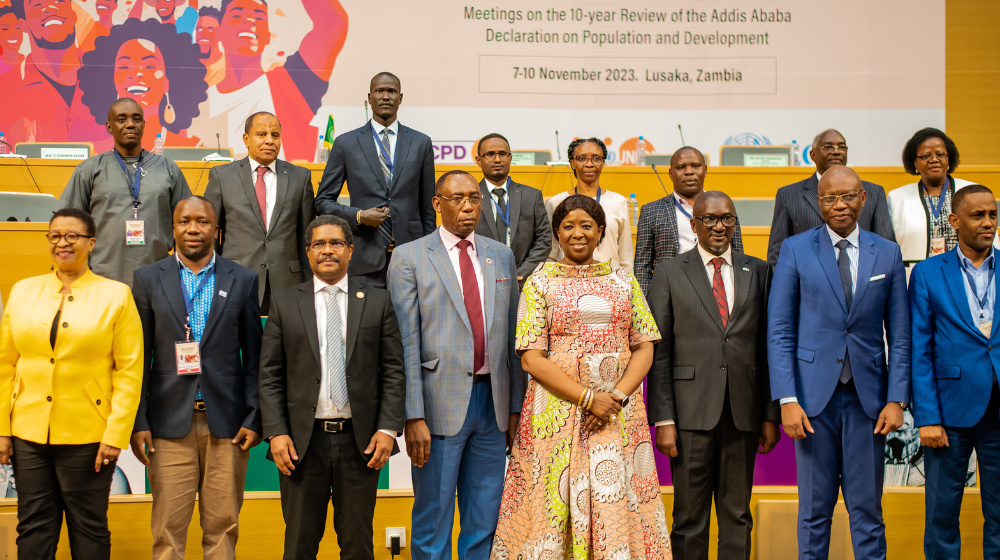A reflection on a decade of commitment, collaboration, and African resilience
As the sun set over Lusaka, Zambia on Friday, 10 November, a vibrant discussion by the Ministers in Charge of Population drew to a close, following two days of receiving reports from the African Population Experts Committee (APEC), and deliberating on the findings and recommendations of the 10-year review report of the Addis Ababa Declaration on Population and Development.
There was a palpable sense of anticipation. In that moment, I found myself thinking what a unique, insightful journey this has been, demonstrable of the passion with which Africa approaches critical issues, yet requiring urgency of action. In this instance, it simply had to be about rights and choices for all.
A decade ago, African ministers gathered and, with shared aspirations and a sprinkle of hope, adopted the Addis Ababa Declaration on Population and Development (AADPD). It was a pivotal moment - a home-grown domestication of commitments to advance the International Conference on Population and Development (ICPD) Programme of Action on the continent.

The AADPD, the product of collaboration and a shared vision, has been a guiding light. It is a rich tapestry of 88 commitments across 6 pillars, intricately woven to support Africa’s quest to harness the demographic dividend and realize the aspirations outlined in Africa's Agenda 2063 and the Sustainable Development Goals.
Standing at the cusp of the 30th anniversary of ICPD and 10 years after the AADPD, a moment ripe with significance, I had navigated through the buzz of the two-day Ministerial session, brimming with a sense of purpose. As I interacted with ministers and heads of delegations, I marvelled at the resilience and commitment that brings Africa together, despite its diversities of culture, sovereignty, demographics, typology of countries and socio-economic aspirations.
The journey towards the Promise of Cairo has been marked with challenges, but as we gathered in Lusaka, the sight of African Population Experts with Ministers in Charge of Population, as well as youth, civil society and other major groups listening with rapt attention to the progress being reported and collectively posing challenging questions that could only allow the continent to forge ahead, was a moment of intense reflection and pride. It felt like a familiar family reunion, intricately fused with multiple opinions – a special event, a coming together, a celebration of achievements, sharing stories, challenging the status quo, highlighting differences and yet collectively invested in the potential of present and future generations.
As the countdown to 2030 moves closer, Africa has reaffirmed that the International Conference on Population and Development (ICPD) Programme of Action remains relevant for Africa and its people.
Accelerated action is needed to prevent needless maternal deaths and unacceptably high levels of gender-based violence and femicide, to reduce the persistent unmet need for family planning empowering the right to plan and choose a family, and access to integrated and people-centered sexual and reproductive health services in a safe, inclusive and non-discriminatory environment. This requires national policies and tailored programmes shaped by data and evidence that are agile and responsive in a manner that can meet the needs of the populations served.
Remember the commitment to harness the demographic dividend? This has to be a commitment realized, with scaled investments in the health, education and employment opportunities for Africa’s young people. Africa remains cognizant of its demographic divide along the life course, which is either a deterrent or a force for good. Africa’s youthful population can propel the socio-economic transformation desired and secure a brighter future for Africa. It can also be a trigger for all that is not desired by the continent. The choice could not have been made clearer in the room full of experts, ministers, United Nations delegations, young people and civil society.
The smartly crafted AADPD10 review report places a much-needed focus on the acceleration of efforts needed to advance sexual and reproductive health and rights in every nook and cranny of the continent. It is about people and their individual well-being, with rights and choices at the heart; it is also about contributing to the prosperity of African nations in a planet-conscious manner, enabled by strong partnerships, fostered by the tenets of human rights and enshrined in peace. Several examples showcase how empowerment and commitment can forge a credible pathway toward sustainable development. They also underscore that gender equality, women and youth empowerment remain at the heart of the AADPD and serve as a commitment to transforming African societies.
I am pleased that the Lusaka meeting provided a platform to discuss priorities and actions for a future-fit Africa. In a world evolving at breakneck speed, Africa needs to play a strategic role in shaping and influencing global agendas. The continent needs to continue leveraging evidence and foresight to guide policies and programmes, through concerted efforts that address current and future challenges.
Africa’s ICPD30 report adopted in Lusaka is therefore pivotal for the 57th session of the Commission on Population and Development, to be held in April 2024. The report places Africa in good stead as we head toward the Summit of the Future in September 2024, with its anticipated negotiated commitments within the Pact of the Future, representing a new international consensus.
Africa needs to remain steadfast in its mission of empowering transformative change agents on the continent - like Lesedi, a 10-year-old girl from Southern Africa; Leila, a 15-year-old girl from North Africa; Koffi, a 21-year-old man from West Africa; Zahara, a 27-year-old woman from East Africa and Amani, a 32-year-old woman from Central Africa.
In the spirit of unity and determination, Africa must continue to demonstrate how it gets things done. The support of the Government of Zambia, and the collaboration between the African Union Commission, the United Nations Economic Commission for Africa, the United Nations Population Fund (UNFPA) and other partners exemplifies the strength of a collective commitment for a bright future ahead.


